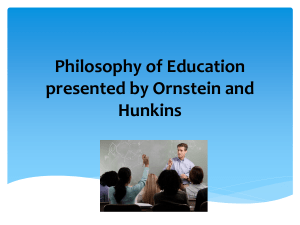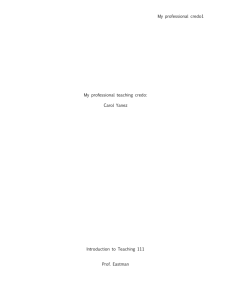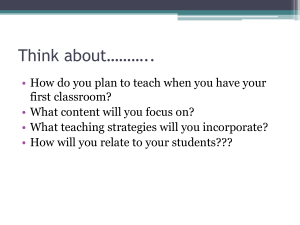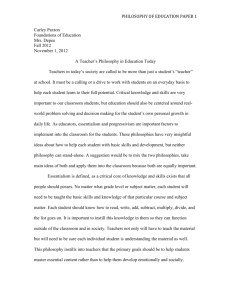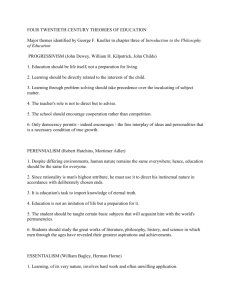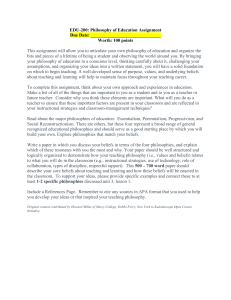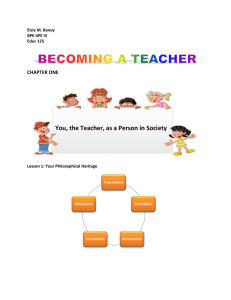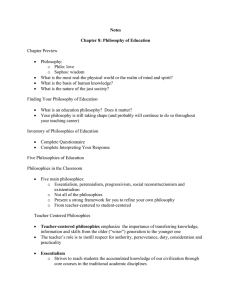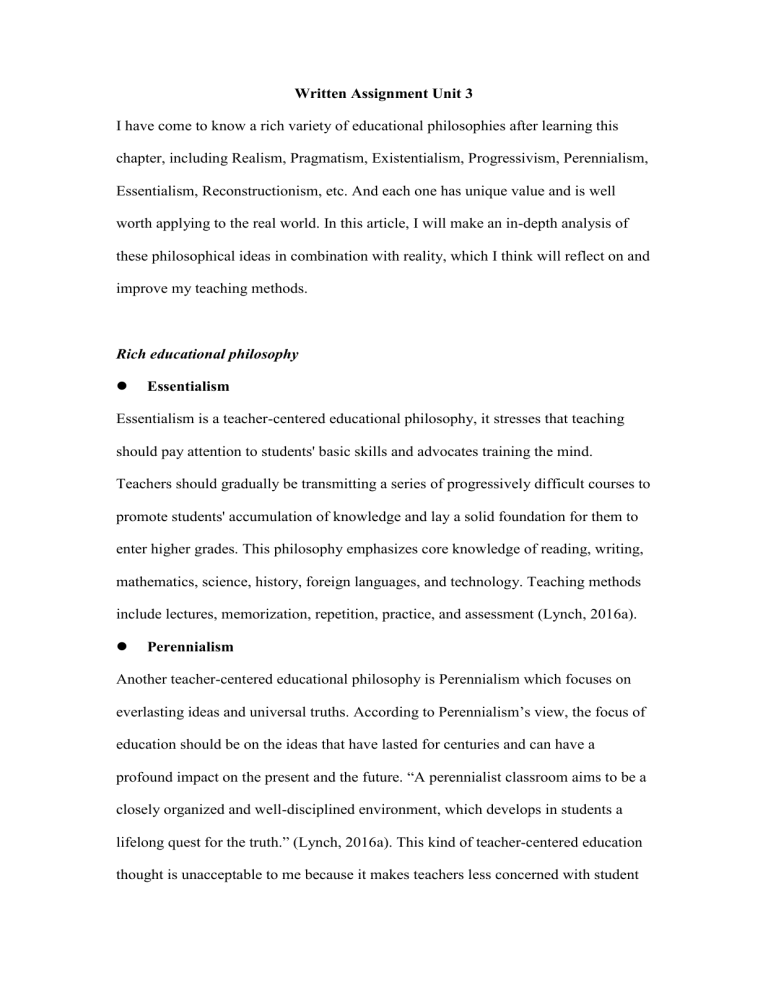
Written Assignment Unit 3 I have come to know a rich variety of educational philosophies after learning this chapter, including Realism, Pragmatism, Existentialism, Progressivism, Perennialism, Essentialism, Reconstructionism, etc. And each one has unique value and is well worth applying to the real world. In this article, I will make an in-depth analysis of these philosophical ideas in combination with reality, which I think will reflect on and improve my teaching methods. Rich educational philosophy Essentialism Essentialism is a teacher-centered educational philosophy, it stresses that teaching should pay attention to students' basic skills and advocates training the mind. Teachers should gradually be transmitting a series of progressively difficult courses to promote students' accumulation of knowledge and lay a solid foundation for them to enter higher grades. This philosophy emphasizes core knowledge of reading, writing, mathematics, science, history, foreign languages, and technology. Teaching methods include lectures, memorization, repetition, practice, and assessment (Lynch, 2016a). Perennialism Another teacher-centered educational philosophy is Perennialism which focuses on everlasting ideas and universal truths. According to Perennialism’s view, the focus of education should be on the ideas that have lasted for centuries and can have a profound impact on the present and the future. “A perennialist classroom aims to be a closely organized and well-disciplined environment, which develops in students a lifelong quest for the truth.” (Lynch, 2016a). This kind of teacher-centered education thought is unacceptable to me because it makes teachers less concerned with student interest and more care about the transmission of knowledge from the older generation to the younger generation. Progressivism Progressivism is based on the philosophy of pragmatism (Hunkins & Ornstein, 2018). Its practicality indicates there is a central position for students in the education process, their needs and interests should be at the center of teaching, and the role of the teacher is to direct the students and motivate them to learn through real-life situations (Tupas & Pendon, 2016). For progressivism, the goal of education should be to cultivate individuals who are capable of independent thinking, have an active learning attitude, care about long-term development, and are willing to make contributions to society. I'm a big fan of progressivism because I believe that every child is unique and has different personalities and needs, so they should be given unique development opportunities. Although this can be difficult to achieve, teachers should do their best to enable children to learn most appropriately and grow at their own pace. Social reconstructionism Social reconstructionism is an educational philosophy that views schools as tools to solve social problems. Rather than a philosophy of education, it may be referred to as more of a remedy for a society that seeks to build a more objective social order (Lynch, 2016b). Those who support this philosophy believe that the purpose of schools is to train students to pay attention to the world situation and social environment, become critical analysts of social problems, and encourage students to become useful talents to promote social change and human development. Existentialism Existentialism emphasizes that students should think carefully about their personalities, beliefs, and various life choices. The first problem for the existentialist is to figure out how to define oneself because you can't know what you need until you know who you are. Existentialists believe that every child is unique and that education should be tailored to individual differences. The purpose of existentialist education is to enable children to develop their unique personalities, discover their potential and find the meaning of life. (Suwarno, 2020). Realism Realism means that certain claims of an object or thing can be made independently of anyone else's ideas. It is based on mind-independent objectivity, It holds that the existence of an object or thing is not determined by whether people perceive it or not. This Philosophy means that “any 'real' object has truths which apply to it, even if no one is perceiving it or thinking about it” (Daniel, 2022). “Realism in education suggests that students should be taught methods that will help them discover objective truths. Therefore, realist educators emphasize critical thinking, logic, and the scientific method, believing these approaches will help students look for evidence for their conclusions, overcome their biases, test their views for coherence, and look for regularity in their experience as a symptom of objective reality” (Daniel, 2022). The connections between educational philosophies in IB education Essentialism and IB education. Essentialism stresses some core curriculums of literacy, mathematics, history, foreign languages, and other essential knowledge and culture of society, the goal is to make students become a group of well-rounded and well-balanced citizens. Coincidentally, the balanced principle of IB education also supports this view. “An IB education provides opportunities to develop both disciplinary and interdisciplinary understanding that meet rigorous standards set by institutions of higher learning around the world. IB programs offer curriculum frameworks and courses that are broad and balanced, conceptual and connected” (the International Baccalaureate Organization, 2012). IB education is guided by “balanced”, which meets the strict standards set by higher education institutions, it offers a curriculum framework and courses that are interdisciplinary, broad and balanced, conceptual and connected. For example, in the “Primary Years Programme”, the goal is broad learning across disciplines and fields. In the “Middle Years Programme” and the “Diploma Programmme”, students need to master more complex professional knowledge and skills and face more stringent academic requirements and personal standards. Progressivism and IB education I strongly agree with Progressivism’s education concept. I believe that only in a student-centered learning environment, the student's potential can be mobilized out. Besides, I think this philosophy can also guide me to improve children's selfawareness, self-control, courage, and confidence. The famous progressive philosopher Rousseau maintained that “people are basically good”, and progressive education buys into the idea (Lynch, 2016b). This view reflects that valuable experience can be generated in the process of interactions between person-to-person and person-tosociety. According to this view, if each child is essentially good, then what they learn from each other will be positive and meaningful, that's the value of social interaction. Coincidentally, the IB system has students “consider their responsibilities when making design decisions and taking action” (The International Baccalaureate Organization, n.d.). I think it reveals that the interactions among inherently good people have strong social value. IB system stressed the principles of “Inquirers”, “Communicators”, and “Open-minded”, these principles fit perfectly into progressivism philosophy. The IB system emphasizes that the student’s natural curiosity and independence in learning should be stimulated, and students should express ideas and information confidently in a variety of modes of communication, they also are encouraged to collaborate with others. Besides, they should have openminded to the perspectives, values, and traditions of other individuals and communities to seek and evaluate a range of points of view and are willing to grow from the experience (The International Baccalaureate Organization, 2012). In practice, my classroom will be less rigid or structured and I can observe the characteristics of each student by organizing some extracurricular practice activities and group cooperation projects and then provide targeted learning guidance and personalized training for children. Social Reconstructionism and IB education I appreciate the philosophy of social reconstructionism, which can give big guidance for students to be successful in an ever-changing world. John Dewey emphasized that social interaction and problem-solving are the most effective ways for children to learn. The view of reconstructionism is very similar to the Principles of IB education, which are the “Thinkers”, “Principled”, “Caring”, and “Risk-takers”. These principles stressed that students should have a strong sense of justice and respect for the individual, groups, and communities. They are encouraged to engage in a range of services and actions to make a positive difference in their lives. At the same time, they should apply critical thinking and independent spirit to defend their beliefs and make reasoned decisions when they confront unfamiliar and complex issues. For me, I appreciate using social reconstructionism to design the course, for instance, I can create some assignments, including teaching students to write political analysis reports, organizing debate competitions on social issues, and encouraging them to give speeches on noteworthy social issues such as religion, racism, poverty, and human rights, etc. I will also cultivate their sense of community, coaching them to take an active part in field research projects, and assist them in creating questionnaires and community improvement programs. References: Daniel, C. [Social Science Courses] (2022, January 25). Realism in Philosophy [Video]. https://study.com/academy/lesson/realism-overview-practical-teaching-examples.html The International Baccalaureate Organization. (n.d.) What is the MYP? https://www.ibo.org/programmes/middle-years-programme/what-is-the-myp/ The International Baccalaureate Organization. (2012) What is an IB education? https://dpi.wi.gov/sites/default/files/imce/cal/pdf/what-is-an-ib-education.pdf Lynch, M. (2016a). Philosophies of education: 2 types of teacher-centered philosophies. The Edvocate. http://www.theedadvocate.org/philosophies-education-2-types-teacher-centeredphilosophies/ Lynch, M. (2016b). Philosophies of education: 3 types of student-centered philosophies. The Edvocate. http://www.theedadvocate.org/philosophies-education-3-types-student-centeredphilosophies/ Hunkins, F. P., & Ornstein, A. C. (2016). Curriculum: Foundations, principles, and issues. Pearson Education. http://daneshnamehicsa.ir/userfiles/file/manabeh/francis_p_hunkins_allan_c_orn stein.pdf Suwarno, S. (2020), Existentialism and its implication in education https://pgsd.binus.ac.id/2020/11/29/existentialism-and-its-implication-toeducation/ Tupas, J. B., & Pendon, G. P. (2016). Prevailing Educational Philosophies among Pre-Service Teachers. IRA International Journal of Education and Multidisciplinary Studies, 3(3), 446–461. http://dx.doi.org/10.21013/jems.v3.n3.p16
